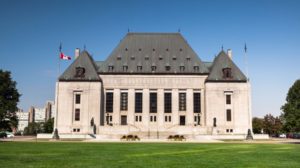This coming Tuesday, April 18th, the Supreme Court of Canada will hear the case of Pintea v Johns (2016 ABCA 99). This case centres on a finding of civil contempt against an elderly disabled man, who was representing himself because he could not afford counsel. Because of a change of address, Mr Pintea did not receive two notices from the court requiring him to appear at a case conference. When he did appear he was found in contempt and penalized with almost $83,000 of costs, a decision upheld by the Alberta Court of Appeal. Mr Pintea is being represented pro bono at the SCC by Colin Feasby of Osler Hoskin Harcourt.
NSRLP is an intervenor in Pintea v Johns and our intervention is being handled pro bono by an incredible team at Bennett Jones led by Ranjan Agarwal and Ilan Ishail. Dayna and Julie are taking our NSRLP research team to Ottawa to watch the hearing, and it’s fair to say: we are psyched!
This is the first time that NSRLP has applied for, and has been awarded, intervenor status. This is something that NSRLP may do again in the future, in very special cases. The Pintea case is special for many different reasons. It relates directly to the way in which SRLs are treated in the courts by judges. It raises critical questions about the type of assistance – sometimes called “active adjudication” – that judges may offer SRLs who are struggling (as Mr. Pintea clearly was, from an early stage, in trying to represent himself).
The issues in Pintea go to the heart of what we understand by Access to Justice by forcing us to think about what we consider to be a fair process. Obviously those who come with counsel are going to be in a better position, in the vast majority of cases, than those who cannot afford legal representation – but what is the minimal standard for a fair process? Does this require both sides to have at least sufficient understanding and assistance to be able to present the arguments for their case?
We hope that the Supreme Court of Canada in Pintea can establish a national set of guidelines for judges facing the extremely challenging task of working with self-represented litigants in their courts. In our intervention we are for advocating standards that, far from creating bias in favour of SRLs, will reset some balance and introduce some fairness into what is inevitably an unequal contest.
Stay tuned!


Fantastic…Bravo to Mr.Feasby, you and your intervening team.
” establish a national set of guidelines for judges facing the extremely challenging task of working with self-represented litigants in their courts. ”
Somehow I think this argument should be the other way around, so it reads “the extremely challenging task of SRLs facing hostile judges in OUR courts(our courts are not theirs). A judges is required to have the REQUIRED TEMPERAMENT to deal with citizens whose taxes allow them to hold the position of judge in our courts.
Ottawa, and all of Canada is so fortunate to have you heading and believing in and standing tall for all that you are and do for people, your students, colleagues, and countless people that you may never have time to meet! Congratulations, and once again, you get to initiate positive and powerful, but more importantly to provide an opportunity for a person to have quality time added back to their daily life.